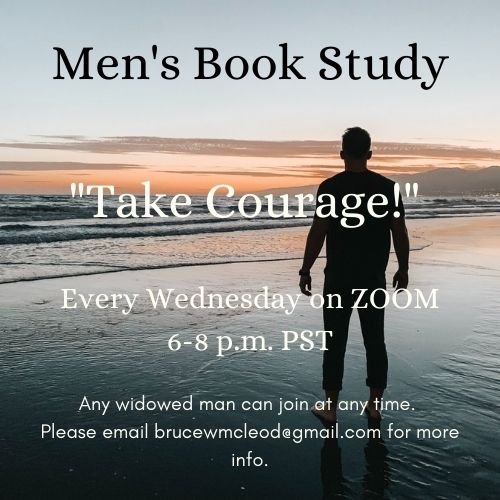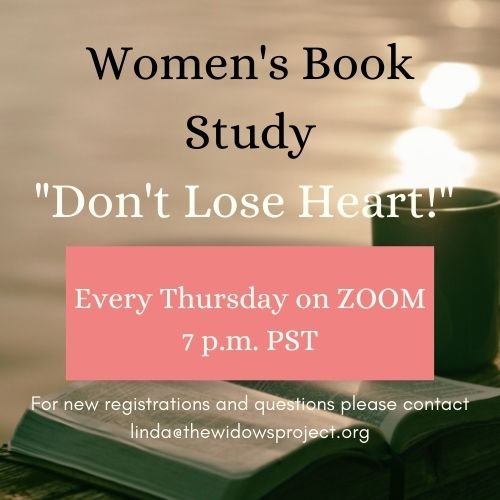October Vlog
Accompanying a Friend Through Grief
A Conversation With Mary Beth Woll and Lynn Baker
Mary Beth: Lynn is not a widow, but she has learned to come alongside me in a way that is very unique. We have often said that widowhood is a club that nobody wants to join, and you don’t really know until you’ve been through it. But Lynn is unique in that she does seem to understand and have compassion almost as if she has been through it herself.
I just wanted to ask you, Lynn, how have you learned how to come alongside me or anybody that’s been widowed?
Lynn: You reminded me of when I was in my early 20’s and my best friend’s father died suddenly during the night. I went over to his house in the middle of the night. I was with his mom during those first few critical hours of finding phone numbers and letting people know. So, I think that was the beginning.
Also, my husband was a pastor and a minister for many years. It was actually a privilege to be with people when their loved ones were passing and to be a support to the family as much as we could.
But it wasn’t until my sister lost her husband, that I saw a whole different side that I didn’t really understand until then.
Mary Beth: And what is it that you learned from your sister?
Lynn: Just that they need you there.
I think I found that sometimes it’s awkward, you don’t know what to say, so you don’t say anything. Maybe you don’t call. You don’t text. But just go. You don’t need the words. You just need to be there.
Mary Beth: And Lynn definitely has that presence and that gift of “being there”.
Lynn is a very calming person. She’s very logical in crisis, as well, so that’s wonderful. She also has a servant’s heart and just wants to be there to help. All those things embody who Lynn is, so that’s really beautiful.
You know, in James 1:27, the Bible tells us that we are to help the widows and orphans in their distress. And it is certainly a distress like no other. And it is very disorienting and disabling in those early hours, days, weeks, months—and we find, actually, in that critical first year.
So, Lynn, you and I were friends before Bob died. You knew Bob a little. What was it like for you to witness me going through that critical time?
Lynn: Again, I just felt like I didn’t have the words for you or the experience or being equipped, but I wanted to be there for you just to let you know that I cared. That was most important.
Mary Beth: Lynn is also a very good listener. What we’ve learned is that when someone goes through a trauma like losing your spouse, you need to tell your story. And sometimes you need to tell it over and over again.
I’m sure Lynn could tell you my stories! She’s heard them a number of times. But it’s that process of telling your story to an empathetic ear and someone who is filled with the Spirit God, too, that really helps you process your trauma.
Another thing I wanted to bring up is that it’s a very common experience that people who have lost a spouse are often surprised by who is there for them and who is not there for them. People who they thought, without a doubt, would be there for them. They are surprised to find that some people kind of disappear. And others that they didn’t particularly expect to be there, seem to come out of the woodwork!
I know that our friendship has certainly deepened since Lynn has been there for me. But we have a reciprocal friendship. It’s not just that she’s there for me. We love each other and listen to each other.
But what are some of your thoughts about that, Lynn—about who’s there, who’s not there?
Lynn: All I can think of is that you just feel awkward. You haven’t been in that experience. You don’t know what to say or what to do, and I think it’s just easier to just not show up, even though you care and love that person. And then everything changes, as I’m sure you know, and then where do you pick up from there?
Mary Beth: Exactly. That’s exactly right.
And something we talked about earlier, is that when you are close friends with someone before your spouse dies, they are also friends with your spouse, so they are grieving the loss of your spouse as well.
And that might be a bit overwhelming for them to come alongside the widowed person because they are also carrying a heavy load of grief.
I know it’s also that way with adult children because they don’t know how to support their parent. They are grieving the loss of their dad or their mom. So, it takes a while for the family to find its balance again. Perhaps that’s why James 1:27 says to come alongside the widow and the orphan in their distress. When we lose a family member, the whole family mobile is thrown out of balance.
So, Lynn, if there is something that you could say to the friend of a widowed person—let’s just say a woman who has lost her spouse—what would you say to that friend?
Lynn: I always think prayer is the most important. But when you are praying for your friend, it challenges you to act on that. You need to reach out and let them know that you care, you’re praying, and that you are there for whatever they need.
Mary Beth: That’s right. And you know, Lynn has been very specific, too, because sometimes when we say, “If you ever need anything, let me know,” the person who has been widowed doesn’t even have the gumption to take the initiative to reach out. But one thing Lynn has done that has been very helpful is that she’s been very practical. “Can I bring you a salad?” “Can I come help you with this?” “Can I do that for you?”
She’s been very specific and that’s then given me the courage to reach out when I do have a need because I know that she’s specifically offered.
So, I hope this is helpful for you today. We understand when you lose a spouse, you lose more than your life partner. You also lose a big part of your social circle—a big hub there. So, your whole social circle needs to reorient itself. That includes our friends. God bless you all!




